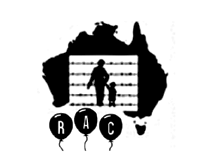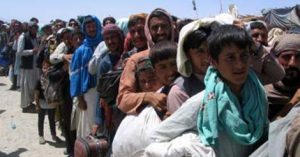For refugees and their supporters, the upcoming 2022 federal election can’t be ignored. Though refugees have not been central to the political campaign, the result of the election will influence the future trajectory for our movement.
The New Zealand deal
When the Coalition government announced the resettlement deal with New Zealand in March, refugee activists were positive but critical. But it is not a deal we can cheer for. The over-riding issue is that like the US deal, and the individual efforts to resettle refugees from Manus and Nauru in Canada, the New Zealand deal is fundamentally about Australia refusing to provide protection for refugees in Australia. The ‘Australian solution’ of offshore detention is now being adopted by the UK which will send boat arrivals to Rwanda.
In total, only 450 refugees will be resettled in New Zealand, 150 per year, taken from New Zealand’s general refugee intake quota of 1500. This draws out the process of resettlement needlessly – many refugees have been waiting nearly a decade for proper resettlement; they shouldn’t have to wait up to three years longer. Neither should the places be taken out of New Zealand’s general quota – this takes places from other refugees who would otherwise be settling in New Zealand.
Of the 120 or so refugees on Nauru around 70 are already engaged in resettlement programs for the USA or Canada, and not eligible. The deal also excludes asylum seekers who do not have refugee status.
The deal also excludes the 104 refugees still in Papua New Guinea. Due to the deal signed with the Papuan government in 2021, Australia formally has no legal responsibility for these men. A separate deal will allow the UNHCR to refer Manus refugees to New Zealand as part of New Zealand’s annual refugee intake. So, to even fill the 150 quota, refugees from Manus and Nauru in Australia will be needed to make up the numbers. But why should those living in Australia be required to go to New Zealand to gain permanent protection? The movement will need to fight for their right to permanent visas in Australia.
There are 1168 asylum seekers living in Australia who have been evacuated from PNG and Nauru for medical care since the latest version of offshore detention began in 2013. In total 505 of them will miss out on resettlement in New Zealand, the US or Canada simply because there are not enough places. The deal also excludes any resettlement for future maritime arrivals.
Worse, both Labor and the Coalition say they will prevent any refugee settled in New Zealand from ever gaining entry to Australia. Yet some have been living in the community here for almost a decade. They have partners, children born here and children who have spent years in Australian schools. All those on bridging visas should be granted permanent visas and allowed to settle in Australia.
Operation Sovereign Borders: still an issue
Despite it receding slightly from the public eye, Operation Sovereign Borders is still as much of an issue as ever. July 2022 will mark nine years since Kevin Rudd declared that no refugee coming by boat would ever gain permanent protection in Australia. After Tony Abbott was elected, the discrimination intensified; with the military deployed to intercept boats and turn them back.
Intense secrecy laws prevent the full reporting of details of “on water” operations. This lack of transparency – and corresponding lack of media coverage – can give people the impression that boats no longer arrive, and the borders are quiet. This is false. In 2021, the United Nations rapporteur on the human rights of migrants reported that at least 800 people on 38 boats had been turned back in the period since 2013.
Furthermore, boat turnbacks and the Coalition’s 2014 ban on accepting UNHCR refugees referred from Indonesia, means there are around 14,000 refugees (half of them Afghans) stuck in an awful state of desperation in Indonesia, who should be settled in Australia. Organisations like the Tamil Refugee Council have also driven home the point that the government deports refugees to countries like Sri Lanka, deeming them “safe” – despite the fact that human rights abuses are still undoubtedly present. There are still Afghan asylum seekers in detention because it was deemed safe for them to return to Kabul. Far from being quiet, the injustices and human rights abuses continue.
Afghan refugees
The Coalition used the budget to announce an intake of 16,500 Afghan refugees over four years. But this is a long way short of the general demand of the movement for an immediate intake of 20,000 in the wake of the Taliban takeover. The thousands of Afghan TPV holders are precluded from family reunion, leaving the family members of refugees in Australia at risk. All the Afghans who have been rejected because Afghanistan was deemed to be safe, according to DFAT country information, must have their refugee assessments reviewed. The simplest step would be a general amnesty for all Afghans, either in detention or in the community.
The political parties and refugees
Sadly, the major parties do not have substantial major differences when it comes to border policy and refugees. Labor has re-affirmed its support Operation Sovereign Borders. When Scott Morrison attacked Labor for being “soft” on refugees, shadow Home Affairs minister Kristina Keneally stated that Morrison is “trying to manufacture a difference with Labor where none exists”.
In fact, Labor has attempted to position themselves as more hardline on refugees than the Coalition. On Twitter, the party attacked the government for supposedly underfunding the brutal Border Force. Keneally also insisted that Labor would legislate to prevent refugees sent to New Zealand from ever being able to come to Australia.
There are two differences between the two sides, however: Labor has promised to abolish Temporary Protection Visas (and SHEVs) and grant all refugee holders of such visas permanent protection. This would mean a substantial improvement in the quality of life for the thousands of refugees stuck in limbo on temporary visas. Labor also says that they would allow the Tamil Biloela family to return to Biloela.
The Greens have decent positions on refugees. They promise to end mandatory and offshore detention, grant permanent protection, raise the refugee quota and do a host of other things that would generally benefit refugees. However, their ability to practically influence policy is limited. Though they may be able to influence whoever is in government through their positions on the crossbench, any attempt to change the main direction of border and refugee policy would be a failure if Labor and the Coalition would simply vote together as they did to entrench indefinite detention with the mis-named Clarifying International Obligations Act in 2021.
Keeping up the fight: the only way forward
As outlined, if Labor wins on 21 May, there will be some important changes to refugee policy. However, simply voting for this or that party will not deliver the change that is needed. Though Labor has promised to abolish TPVs if they win, the thousands of people including medical transfers from Manus and Nauru on bridging visas will remain in limbo.
The bipartisan commitment to mandatory and offshore detention and boat turnbacks will be unaffected by the election result; all the more reason to redouble our efforts to build a mass movement.
In order to free the refugees, we need a serious movement capable of forcing change, not just asking for it. The Refugee Action Coalition is committed to this goal above all. We organise rallies, forums and other events in order to raise awareness and galvanise people to demonstrate to whoever is in government that the refugees have people power behind them. There is much unfinished business. We encourage anyone who wishes to get involved to come to our regular meetings, held fortnightly on Monday evenings, at the Teachers’ Federation building.



